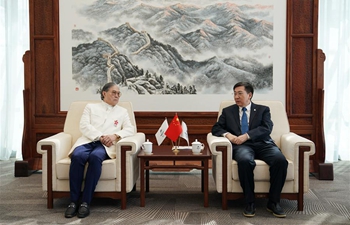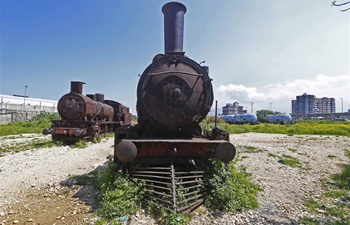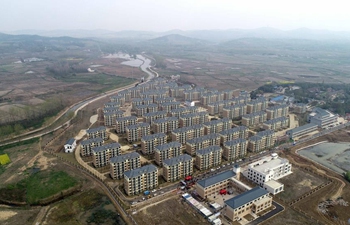
Estonian Prime Minister Juri Ratas (C) speaks at the meeting of the 14th Estonian parliament Riigikogu in Tallinn, Estonia, on April 4, 2019. Estonia's outgoing coalition government stepped down as per procedure after the country's 14th Riigikogu (parliament) convened on Thursday. (Xinhua/Estonian Parliament/Erik Peinar)
TALLINN, April 4 (Xinhua) -- Estonia's outgoing coalition government stepped down as per procedure after the country's 14th Riigikogu (parliament) convened on Thursday.
However, under Estonian law the government continues its term until a new coalition is agreed and appointed.
Prime Minister Juri Ratas, leader of the Estonian Centre Party, has announced the resignation of the outgoing coalition in parliament. The current government was formed in Nov. 2016, by the Centre Party, the Pro Patria and Res Publica Union (known as Isamaa since June 2018) and the Social Democratic Party after then Prime Minister Taavi Roivas of the Reform Party lost a confidence vote in parliament.
The Centre Party is currently in coalition talks with the Conservative People's Party of Estonia and the Isamaa Party after over three weeks of discussion, and the new coalition government is expected to be unveiled on Saturday, according to Ratas.
In the parliamentary elections held on March 3, five political parties won seats in the 14th Riigikogu for a four-year term. The Reform Party has 34 seats, the Centre Party 26, the Conservative People's Party 19, the Isamaa Party 12 and the Social Democratic Party 10.
However, the Reform Party has refused to form a coalition with the Conservative People's Party, while the Centre Party rejected Reform Party leader Kaja Kallas's offer to enter into a coalition with her party -- which means that Reform could not set up a coalition, which would need a minimum 51 seats out of the total 101 in parliament.











